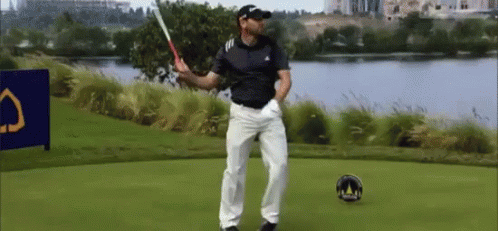Síguenos
PIMSLEUR APPROACH SPANISH
III - Lesson 23:
Lección
Veintitrés
Escuche
esta conversación. Consuelo arrives at the hotel to
take John to the club. You'll hear him say "Dime" which is the
familiar form for "Tell me." Escuche.
Hola John.
¿Estás listo para ir al club?
Sí,
Consuelo. Hace buen tiempo para jugar al tenis, ¿verdad?
De acuerdo.
Hoy es un día magnífico.
Sí. No hace
demasiado calor.
¿Queda
lejos el club?
Sólo a diez
kilómetros de aquí. Vamos a estar allí en quince minutos.
¡Qué bien!
Dime. ¿También prácticas otros deportes?
Me gusta
jugar al golf, pero raras veces tengo suficiente tiempo.
Hi John. Are you ready to go to the club?
Yes, Consuelo. Nice weather to play tennis,
hmmm?
I agree. Today is a magnificent day.
Yes. Not too hot.
Is the club far away?
Only ten miles from here. We'll be there in
fifteen minutes.
Great! Tell me. Do you play other sports?
I like to play golf, but rarely have enough
time.
Now suppose that you're having lunch with
an acquaintance of long standing. Using the "tú" form, ask, "Do
you play any sports?" [Remember, it's literally "Do you practice any
sport?"]
¿Practicas algún deporte?
Lesson 23 at 1:41
Tuteando, ella
pregunta, "And you? In your free time, do you play
any sports?
¿Y tú? En
su tiempo libre, ¿practicas algún deporte?
Conteste,
"Seldom."
Raras
veces.
Dígale que
usted prefiere trabajar en el jardín.
Prefiero
trabajar en el jardín.
Dígale que
a veces le gusta caminar.
A veces me
gusta caminar.
Ella le dice, "Right now I'm going to
take a walk."
Ahora
mismo, yo voy a caminar.
Tuteando,
¿cómo pregunta ella? "Do you want to come with me?"
¿Quieres
venir conmigo?
I can show you [familiar] a beautiful
garden near here. You
shouldn't miss it!
Puedo
mostrarte un jardín bonito cerca de aquí. ¡No debes
perdértelo!
Diga, "Fine! It's a pleasant day for
walking."
¡Bien! Es
un día agradable para caminar.
On your way out the door you say,
"Just a moment! I left my credit card on the table."
¡Un momentito!
Dejé mi tarjeta en la mesa.
Now on your walk you see the garden. Say,
"What a beautiful garden!"
¡Qué jardín más bonito!
Tuteando, ahora pregúntele, "Do you
want to go to the movies tonight? There's an extremely good film. I don't want
to miss it."
¿Quieres ir
al cine esta noche? Hay una película buenísima. ¡No quiero perdérmela!
It's called "Seldom in America."
Se llama,
"Raras Veces en Norteamérica."
Su conocida le dice, "I don't want to
miss it either! I don't want to miss the film."
¡No quiero
perdérmela tampoco! No quiero perderme la película.
Now you're at a gathering in a your
friend's home. You've brought flowers for your hostess. How does she say,
"What beautiful flowers! A great many thanks!"
¡Qué flores
más bonitas! ¡Muchísimas gracias!
¿Cómo dice ella? "My husband is
upstairs with the children. But in the meantime, allow me to introduce to you
Ana Benítez."
Mi esposo
está arriba con los niños. Pero mientras tanto, permítame presentarle a Ana
Benítez.
Dígale, "Pleased to meet you."
Encantado. Mucho
gusto en conocerla.
You introduce yourself and make small talk.
Ask her if she has children.
¿Tiene
hijos?
¿Usted
tiene hijos, señora?
¿Cómo dice ella? "Yes, I have a son
and a daughter."
Sí, tengo
un hijo y una hija.
But the children no longer live with us.
Pero los
hijos ya no viven con nosotros.
You've used "ya" before to mean
"already." In a negative sentence it means "anymore" or
"no longer." Ahora,
dice, "The children no longer live with us."
Los hijos
ya no viven con nosotros.
Pregúntele
a qué se dedican.
¿A qué se
dedican?
¿A qué se
dedican ellos?
Ella le dicen, "My daughter, Monica,
is an engineer."
Mi hija,
Mónica, es ingeniera.
My son, Pablo, just finished his studies.
Mi hijo,
Pablo, acaba de terminar sus estudios.
He no
longer studies.
Ya no
estudia.
He's going to look for work.
Va a buscar trabajo.
In the meantime, he has a lot of free time,
so he practices a lot of sports.
Mientras
tanto, tiene mucho tiempo libre, así que practica muchos deportes.
Especially
golf.
Especialmente
el golf.
But he no longer lives at home.
Pero él ya
no vive en casa.
Pregúntele, "And you [formal] - do you
play any sports?"
Y usted,
¿practica algún deporte?
Ella le contesta, "From time to time,
but I seldom have enough time."
De vez en
cuando, pero raras veces tengo suficiente tiempo.
Ahora pregunte, "Your son is going to
look for work?"
¿Su hijo va
a buscar trabajo?
She answers, "Yes, he wants to
teach."
Sí, quiere
enseñar.
Ella le
dice, "Pablo wants to teach."
Pablo quiere enseñar.
He was a good student.
Fue buen estudiante.
What did he study? [simple past tense (i.e.
preterit), not imperfect]
¿Qué
estudió?
¿Qué
estudió él?
Ella le
dice, "He studied languages."
Estudió
idiomas.
He wants to teach at a private school.
Quiere
enseñar en una escuela privada.
¿Cómo se
dice? at a school
en una
escuela
at a
private school
en una
escuela privada
Pregúntele a ella,
"So he wants to be a teacher?"
¿Así que
quiere ser profesor?
Ella le contesta, "Yes, he wants a
position at a school."
Sí, quiere
un puesto en una escuela.
a private
school
una escuela
privada
Ask her what languages he studied. [use
simple past tense, i.e. preterit]
¿Qué
idiomas estudió?
Ella le
dice, "English and French."
Inglés y francés.
He studied English and French.
Estudió
inglés y francés.
Trate de
decir, "He's always wanted to teach."
Siempre ha
querido enseñar.
But he wants to teach in a private school.
Pero quiere
enseñar en una escuela privada.
I wish him [I desire for him] success.
Le deseo éxito.
I wish him the greatest [a great deal of]
success.
Le deseo
muchísimo éxito.





